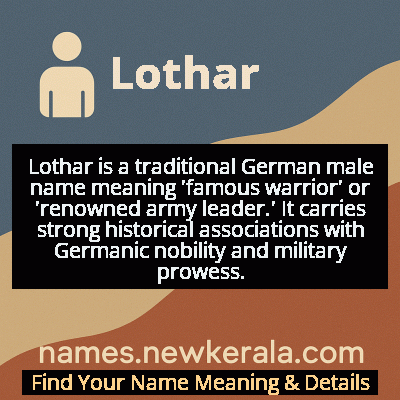Lothar Name Meaning & Details
Origin, Popularity, Numerology Analysis & Name Meaning of Lothar
Discover the origin, meaning, and cultural significance of the name LOTHAR. Delve into its historical roots and explore the lasting impact it has had on communities and traditions.
Name
Lothar
Gender
Male
Origin
German
Lucky Number
2
Meaning of the Name - Lothar
Lothar is a traditional German male name meaning 'famous warrior' or 'renowned army leader.' It carries strong historical associations with Germanic nobility and military prowess.
Lothar - Complete Numerology Analysis
Your Numerology Number
Based on Pythagorean Numerology System
Ruling Planet
Moon
Positive Nature
Diplomatic, friendly, artistic, empathetic.
Negative Traits
Over-sensitive, moody, indecisive, prone to self-pity.
Lucky Colours
Green, cream, white.
Lucky Days
Monday.
Lucky Stones
Pearl, moonstone.
Harmony Numbers
1, 3, 4.
Best Suited Professions
Diplomats, mediators, caregivers, artists.
What People Like About You
Cooperative spirit, friendliness, artistic talent.
Famous People Named Lothar
Lothar I
Holy Roman Emperor
Ruled as Emperor from 817-855 and divided the Carolingian Empire through the Treaty of Verdun
Lothar Matthäus
Professional Footballer
German football legend who captained West Germany to 1990 World Cup victory and won Ballon d'Or
Lothar von Richthofen
Fighter Pilot
German flying ace with 40 aerial victories, younger brother of the Red Baron
Lothar de Maizière
Politician
Last Prime Minister of East Germany who oversaw German reunification
Name Variations & International Equivalents
Click on blue names to explore their detailed meanings. Gray names with will be available soon.
Cultural & Historical Significance
In Germanic folklore and cultural traditions, names beginning with 'Loth-' often carried connotations of heritage and battle prowess, making it a popular choice among warrior classes and ruling elites. The name's persistence through centuries reflects its enduring connection to German cultural identity and historical continuity. During the Holy Roman Empire period, several notable figures bore variations of the name, reinforcing its aristocratic associations. The name also appears in various historical chronicles and literary works, further cementing its place in German cultural heritage as a symbol of strength and leadership.
Extended Personality Analysis
Individuals named Lothar are typically perceived as strong-willed, determined, and natural leaders with a commanding presence. They often exhibit qualities of reliability, loyalty, and a protective nature toward those they care about. The historical warrior connotations of the name suggest someone who is courageous in facing challenges and steadfast in their principles. Lothars are often seen as traditionalists who value honor and duty, yet they can also demonstrate strategic thinking and practical problem-solving abilities.
Their strength of character is frequently balanced by a deep sense of responsibility and commitment to their goals and relationships. While they may appear reserved initially, they possess inner resilience and the capacity for decisive action when circumstances demand it. People with this name often display a quiet confidence rather than overt aggression, embodying the concept of strength through stability rather than force. They tend to be methodical in their approach to life's challenges and often serve as pillars of support within their families and communities, living up to the name's historical associations with protection and leadership.
Modern Usage & Popularity
In contemporary times, Lothar remains a distinctly German name that has maintained a steady, though not widespread, usage primarily in German-speaking countries. The name experienced some revival in the mid-20th century but has become less common in recent decades, often perceived as traditional or slightly old-fashioned. It continues to be used by families with strong German heritage or those appreciating historical names with warrior connotations. While not among the top baby names in Germany today, it retains cultural resonance and is occasionally chosen by parents seeking a strong, classic German name with historical depth. The name's usage outside German-speaking regions is rare but does occur in communities with German diaspora connections, where it serves as a cultural marker and connection to ancestral roots.
Symbolic & Spiritual Meanings
Symbolically, Lothar represents strength, leadership, and historical legacy. The name evokes images of medieval warriors and noble rulers, carrying connotations of protection, authority, and enduring power. It symbolizes the connection between individual identity and cultural heritage, serving as a bridge to Germanic history and traditions. Metaphorically, Lothar suggests someone who stands firm in their convictions and possesses the resilience to overcome obstacles. The name also embodies the concept of legacy and continuity, representing how personal strength can be rooted in historical precedent and cultural memory. In a broader sense, it symbolizes the warrior spirit adapted to modern contexts—not necessarily physical combat, but the courage to face life's challenges with determination and honor, making it a name that carries both historical weight and contemporary relevance.

